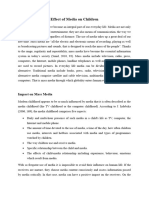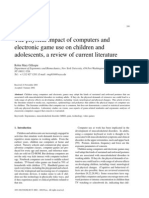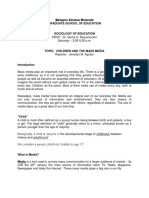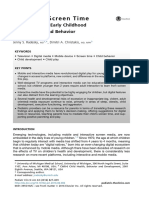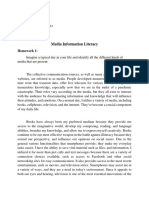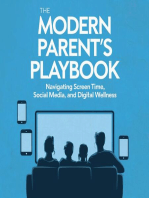Electronic Media Electronic Media Are
Electronic Media Electronic Media Are
Uploaded by
Sarvesh JaiswalCopyright:
Available Formats
Electronic Media Electronic Media Are
Electronic Media Electronic Media Are
Uploaded by
Sarvesh JaiswalOriginal Description:
Original Title
Copyright
Available Formats
Share this document
Did you find this document useful?
Is this content inappropriate?
Copyright:
Available Formats
Electronic Media Electronic Media Are
Electronic Media Electronic Media Are
Uploaded by
Sarvesh JaiswalCopyright:
Available Formats
Electronic media Electronic media are media that use electronics or electromechanical energy for the end-user (audience)
to access the content. This is in contrast to static media (mainly print media), which today are most often created electronically, but don't require electronics to be accessed by the end-user in the printed form. The primary electronic media sources familiar to the general public are better known as video recordings, audio recordings, multimedia presentations, slide presentations, CD-ROM and online content. Most new media are in the form of digital media. However, electronic media may be in either analog or digital format. Although the term is usually associated with content recorded on a storage medium, recordings are not required for live broadcasting and online networking. Any equipment used in the electronic communication process (e.g. television, radio, telephone, desktop computer, game console, handheld device) may also be considered electronic media. Uses Electronic media are ubiquitous in most of the developed world. As of 2005, there are reports of satellite receivers being present in some of the most remote and inaccessible regions of China. Electronic media devices have found their way into all parts of modern life. The term is relevant to media ecology for studying its impact compared to printed media and broadening the scope of understanding media beyond a simplistic aspect of media such as one delivery platform (e.g. the World Wide Web) aside from many other options. The term is also relevant to professional career development regarding related skill sets.
Primary uses of electronic media:
Journalism o News Marketing o Advertisi ng o Graphic Design Education o Professio nal Training Science Engineering Fine Art o Video o Digital photogra phy o Digital Art o Experime ntal music
Commerce o Industry o Corporate Communic ations o Business Presentati ons o Telecomm uting Software Interfaces Computer Simulations Virtual Reality Entertainment o Television o Video Games o Movies o Music
Government o Infrastructure Communicati ons Transportati on Public Services o Military Nonprofit Services
Effects on Children
The effects on children by electronic media (TV, movies, video games, Internet, advertising and others) has been profound in the United States. While these media outlets can provide education and entertainment to children, many researches are concerned with the negative impact electronic media is having on children. The American Academy of Pediatrics was so concerned about these negative effects that they launched a campaign in 1997 called Media Matters to help pediatricians, parents and children become more aware of the influence that media have on child and adolescent health. Concerns they have center around the following:
Time It has been estimated that children in the United States watch about 4 hours of TV every day (that estimate continues to rise). If you also add in the time spent listening to music, playing video games and on the Internet then a large portion of a child's day is spent in front of a television or computer rather than on healthier activities like interacting with others or reading. Nutrition Obesity in U.S. children is at epidemic levels. Children who spend a lot of time watching TV, playing video games or on the computer are more likely to be obese because they are not spending enough time playing or getting exercise. They also view thousands of commercials each year for unhealthy foods -- snacks, sugary cereals and candy -- which influence their eating habits. Violence Numerous research studies have shown a direct correlation between aggressive behavior and children who see violence on TV or play violent video games. A 2004 study, which looked at violence in video games, showed that teens who play violent video games for extended periods of time demonstrate the following behaviors: 1. 2. 3. 4. Tend to be more aggressive. Are more prone to confrontation with their teachers. May engage in fights with their peers. See a decline in school achievements (Gentile et al, 2004).
Sex In addition to increased violent content in electronic media, children are today exposed to more adult behaviors, like sex. Much of this content is shown to be normal, fun, exciting but without discussion of the risks of early sexual activity, pregnancy or sexually transmitted infections. Children often copy these behaviors in order to make themselves feel like an adult.
You might also like
- Aurangzeb: Abul Muzaffar Muhy-ud-Din Muhammad Aurangzeb Alamgir (UrduDocument23 pagesAurangzeb: Abul Muzaffar Muhy-ud-Din Muhammad Aurangzeb Alamgir (UrduSarvesh JaiswalNo ratings yet
- Dsp1a RduchDocument17 pagesDsp1a RduchJairoGRNo ratings yet
- Dm2a1 - 32002 2 0313.Document1 pageDm2a1 - 32002 2 0313.Mariam ZouhairNo ratings yet
- Citroën: Technical TrainingDocument156 pagesCitroën: Technical TrainingRomeo Pecalevski100% (2)
- 2007 PT CruiserDocument458 pages2007 PT Cruisererjenkins1No ratings yet
- Fluid AmplifiersDocument19 pagesFluid Amplifiersbalu54100% (2)
- Effects of Media On ChildrenDocument7 pagesEffects of Media On ChildrenMoumi RoyNo ratings yet
- Topic No 6Document8 pagesTopic No 6Angelica Formento EnriquezNo ratings yet
- RRLDocument18 pagesRRLvina virayoNo ratings yet
- Impact of ComputerDocument11 pagesImpact of ComputergopscharanNo ratings yet
- The Impact of Media On Vulnerable Children and Adolescents: Position Statement 72Document5 pagesThe Impact of Media On Vulnerable Children and Adolescents: Position Statement 72Gugan BalakrishnanNo ratings yet
- Digital World: Electronic GadgetsDocument9 pagesDigital World: Electronic GadgetsAli JohnNo ratings yet
- Case Study KemerutDocument11 pagesCase Study KemerutDeguzman AngeloNo ratings yet
- Practical Research 1Document11 pagesPractical Research 1Charito GallanaNo ratings yet
- The Impact of Child Maltreatment Among ChildrenDocument9 pagesThe Impact of Child Maltreatment Among Children22101970No ratings yet
- Media Survey Outer BridgeDocument1 pageMedia Survey Outer Bridgeapi-21845541No ratings yet
- Impact of E-Media On Adults.Document4 pagesImpact of E-Media On Adults.Sonu GeorgeNo ratings yet
- Harmful Effect of Commonly Used Electronic Devices On Adolescence and Its Safeguard at Shebin El-KomDocument15 pagesHarmful Effect of Commonly Used Electronic Devices On Adolescence and Its Safeguard at Shebin El-KomRyan SyahMemethNo ratings yet
- Review of Related LiteratureDocument14 pagesReview of Related Literaturekylle orlandaNo ratings yet
- Whereas The Disadvantage of Technology Is Affecting The Physical Health and Emotional HealthDocument4 pagesWhereas The Disadvantage of Technology Is Affecting The Physical Health and Emotional HealthZhao Sheng 诏胜No ratings yet
- The Psychological Impact of Media On Adolescents: Ms. Agnes Monica VictorDocument6 pagesThe Psychological Impact of Media On Adolescents: Ms. Agnes Monica VictorAmandeep MalikNo ratings yet
- Children and The MediaDocument12 pagesChildren and The MediaanoviNo ratings yet
- Low Academic Performance of The Senior High Students of Daniel Maramba National High School Because of GadgetsDocument4 pagesLow Academic Performance of The Senior High Students of Daniel Maramba National High School Because of Gadgetsedrick iglesiasNo ratings yet
- CYBERSPACEDocument10 pagesCYBERSPACERani EkaNo ratings yet
- ProjectDocument35 pagesProjectRajNo ratings yet
- Gender and Media Consumption - Wajid AliDocument20 pagesGender and Media Consumption - Wajid AlichwajidNo ratings yet
- Group 4Document12 pagesGroup 4Aria FischaNo ratings yet
- Topic 18. The Ever-Increasing Use of Digital Devices Such As Smartphones and Tablets Has Had A Significant Impact On Children's LivesDocument2 pagesTopic 18. The Ever-Increasing Use of Digital Devices Such As Smartphones and Tablets Has Had A Significant Impact On Children's Lives君DNo ratings yet
- The Effect of Technology On FaceDocument23 pagesThe Effect of Technology On FaceJamie BagundolNo ratings yet
- Impact of Media and Internet On Modern YouthDocument4 pagesImpact of Media and Internet On Modern Youthlakshmi18No ratings yet
- Adolescents - Technology & MediaDocument3 pagesAdolescents - Technology & MediaSarwangNo ratings yet
- Electronic Media As A Driving Force of Social ChangesDocument4 pagesElectronic Media As A Driving Force of Social ChangesAssignmentLab.comNo ratings yet
- InternetDocument5 pagesInternetzunairahanif976No ratings yet
- Topic 1 Overview of Station Opreation ManagementDocument40 pagesTopic 1 Overview of Station Opreation Managementilesanmi rushdahNo ratings yet
- Grand Project SynopsisDocument6 pagesGrand Project SynopsisAnuraag Reyan MahantaNo ratings yet
- Research ProjectDocument8 pagesResearch ProjectpalomarpixieNo ratings yet
- Revised Report - SociologyDocument18 pagesRevised Report - SociologyJemelyn AguilarNo ratings yet
- Revised Report - SociologyDocument18 pagesRevised Report - SociologyJemelyn AguilarNo ratings yet
- Artigo PublicadoDocument10 pagesArtigo PublicadoTiciane LiberatoNo ratings yet
- Review of Related LiteratureDocument4 pagesReview of Related LiteratureJennelManaloNo ratings yet
- The Influence of Technology On Family Dynamics PDFDocument18 pagesThe Influence of Technology On Family Dynamics PDFJae KewNo ratings yet
- English Research PaperDocument5 pagesEnglish Research PaperRachell GulayanNo ratings yet
- Parental Perceptions of The Influence of Digital Media and Technology On Children'S Reading Habits at HomeDocument4 pagesParental Perceptions of The Influence of Digital Media and Technology On Children'S Reading Habits at HomeAbegail Sotto AyrosoNo ratings yet
- CHAPTER TWO Impact of Social MediaDocument8 pagesCHAPTER TWO Impact of Social MediaMes ChampagneNo ratings yet
- Daryll B Cruz Position-Paper (The Creation of Internet)Document7 pagesDaryll B Cruz Position-Paper (The Creation of Internet)Daryll CruzNo ratings yet
- Lesson 5 Digital Technology and Social ChangeDocument14 pagesLesson 5 Digital Technology and Social ChangeIshang IsraelNo ratings yet
- The Social Impacts of Television and Social MediaDocument4 pagesThe Social Impacts of Television and Social MediaClaire Kaye Carson100% (1)
- Should Parents Limit How Much Time Children Spend in Tech Device? EssayDocument5 pagesShould Parents Limit How Much Time Children Spend in Tech Device? EssayHafiz Jusoh100% (2)
- Screen Time PaperDocument6 pagesScreen Time PaperBrittany Wright PruittNo ratings yet
- Group Report (After Modification)Document6 pagesGroup Report (After Modification)André BeiresNo ratings yet
- Draft Term Paper Group 1Document2 pagesDraft Term Paper Group 1NUR E'ZZATI MAT TAIBNo ratings yet
- Jenii 2016Document13 pagesJenii 2016Widia SariNo ratings yet
- Lopez Fernandez 2021 Emerging Health and Education IssueDocument19 pagesLopez Fernandez 2021 Emerging Health and Education IssueAna Paula GomesNo ratings yet
- Review of Related LiteratureDocument33 pagesReview of Related Literatureits meNo ratings yet
- Project ReportDocument57 pagesProject ReportruchiyaNo ratings yet
- MIL Homework 1Document2 pagesMIL Homework 1Loraine Andrei DeLeonNo ratings yet
- Elc501 Waa Article 2Document3 pagesElc501 Waa Article 2Muhd AidielNo ratings yet
- Types of Electronic MediaDocument5 pagesTypes of Electronic Mediaeeqanabeella0% (1)
- Children and Technology: What Is Screen Time?Document3 pagesChildren and Technology: What Is Screen Time?szygardeNo ratings yet
- Using ICT in the Early Years: Parents and Practitioners in PartnershipFrom EverandUsing ICT in the Early Years: Parents and Practitioners in PartnershipNo ratings yet
- Technology in Education 531Document4 pagesTechnology in Education 531api-237404690No ratings yet
- Comparison of Print Media and Electronic MediaDocument3 pagesComparison of Print Media and Electronic MediaROMAR AYUBANNo ratings yet
- The Impact of Technologies On Young Children Depends On Their Age and CharacteristicsDocument3 pagesThe Impact of Technologies On Young Children Depends On Their Age and CharacteristicsMohamed AhsanNo ratings yet
- The Impact of MediaDocument79 pagesThe Impact of MediaSardar AhmadkhanNo ratings yet
- Entertainment QuestionnaireDocument18 pagesEntertainment QuestionnairermtadtadNo ratings yet
- The Modern Parent's Playbook: Navigating Screen Time, Social Media, and Digital WellnessFrom EverandThe Modern Parent's Playbook: Navigating Screen Time, Social Media, and Digital WellnessNo ratings yet
- IndexDocument1 pageIndexSarvesh JaiswalNo ratings yet
- History & Development of English Drama Kinds of Drama: Tragedy, Comedy, Tragi, - Comedy Historical PlacesDocument1 pageHistory & Development of English Drama Kinds of Drama: Tragedy, Comedy, Tragi, - Comedy Historical PlacesSarvesh JaiswalNo ratings yet
- Akbar The GreatDocument2 pagesAkbar The GreatSarvesh JaiswalNo ratings yet
- Comparative Study and Qualitative Analysis of Different Brands of Cold DrinksDocument1 pageComparative Study and Qualitative Analysis of Different Brands of Cold DrinksSarvesh JaiswalNo ratings yet
- Gol GumbadDocument2 pagesGol GumbadSarvesh JaiswalNo ratings yet
- Cloud: Cumulus Swifts CreekDocument3 pagesCloud: Cumulus Swifts CreekSarvesh JaiswalNo ratings yet
- Dhuandhar FallsDocument5 pagesDhuandhar FallsSarvesh JaiswalNo ratings yet
- Textile HistoryDocument4 pagesTextile HistorySarvesh Jaiswal100% (1)
- 'Bhimsen Joshi From Wikipedia, The Free Encyclopedia: Jump To:navigation, SearchDocument8 pages'Bhimsen Joshi From Wikipedia, The Free Encyclopedia: Jump To:navigation, SearchSarvesh JaiswalNo ratings yet
- Amrita PritamDocument5 pagesAmrita PritamSarvesh JaiswalNo ratings yet
- C. P. Ramanujam: Chakravarthi Padmanabhan Ramanujam (January 9, 1938 - October 27, 1974) Was An IndianDocument2 pagesC. P. Ramanujam: Chakravarthi Padmanabhan Ramanujam (January 9, 1938 - October 27, 1974) Was An IndianSarvesh JaiswalNo ratings yet
- Origin of The Word: Banca, From Old High German Banc, Bank "Bench, Counter". Benches Were Used As Desks orDocument6 pagesOrigin of The Word: Banca, From Old High German Banc, Bank "Bench, Counter". Benches Were Used As Desks orSarvesh JaiswalNo ratings yet
- Cropping PatternsDocument21 pagesCropping PatternsSarvesh JaiswalNo ratings yet
- A How-To Guide To A Balanced Diet.: An Industry Worth Around 350 Million A YearDocument3 pagesA How-To Guide To A Balanced Diet.: An Industry Worth Around 350 Million A YearSarvesh JaiswalNo ratings yet
- Alpha, Beeta, Gamma Competition Classes Alpha, Beeta, Gamma Competition ClassesDocument1 pageAlpha, Beeta, Gamma Competition Classes Alpha, Beeta, Gamma Competition ClassesSarvesh JaiswalNo ratings yet
- Balance Diet 1Document10 pagesBalance Diet 1Sarvesh Jaiswal100% (1)
- Alam AraDocument5 pagesAlam AraSarvesh JaiswalNo ratings yet
- Circuit Analysis LabDocument34 pagesCircuit Analysis LabveeraNo ratings yet
- Designing Controlled-Impedance Vias: DesignfeatureDocument4 pagesDesigning Controlled-Impedance Vias: DesignfeatureVarun GuptaNo ratings yet
- ProSafe RS IntroductionDocument53 pagesProSafe RS IntroductionNuman100% (3)
- Automation ABB (PLC)Document68 pagesAutomation ABB (PLC)Alfiansyah Dharma Setia DjaketraNo ratings yet
- Protection, Maintenance and Testing of Capacitor Units 26/963Document5 pagesProtection, Maintenance and Testing of Capacitor Units 26/963Ashfaque AhmedNo ratings yet
- Design Considerations For An Inverter Output Filter To Mitigate The Effects of Long Motor Leads IDocument8 pagesDesign Considerations For An Inverter Output Filter To Mitigate The Effects of Long Motor Leads IJavier MaldonadoNo ratings yet
- G - ST - TSH - 011D - Technical Offer OCTANS IV SurfaceDocument16 pagesG - ST - TSH - 011D - Technical Offer OCTANS IV SurfaceAllison HolmesNo ratings yet
- 2235 Metron C and D MDDocument2 pages2235 Metron C and D MDStephen Rincon GonzalezNo ratings yet
- ST 2502 ManualDocument2 pagesST 2502 ManualMohd YasirNo ratings yet
- Schott 235 245 Data SheetDocument2 pagesSchott 235 245 Data SheetThomas KrtNo ratings yet
- Digital-On-Top Physical Verification: LVS and DRC Using Innovus and CalibreDocument58 pagesDigital-On-Top Physical Verification: LVS and DRC Using Innovus and CalibreKumar Kumar100% (1)
- P12x - Wiring DiagramDocument2 pagesP12x - Wiring DiagramChheng Kimhok100% (1)
- Indian Electricity Act, 1910 and Indian Electricity Rules, 1956Document3 pagesIndian Electricity Act, 1910 and Indian Electricity Rules, 1956Muskan PhogatNo ratings yet
- ANSI / IEEE C37.2 Device NumbersDocument5 pagesANSI / IEEE C37.2 Device NumbersDieguiten2No ratings yet
- LR-TB5000 IM 96M12739 GB WW 1034-3aDocument12 pagesLR-TB5000 IM 96M12739 GB WW 1034-3aregiomontanus5423No ratings yet
- 9500MPR - MEF8 Circuit Emulation ServicesDocument5 pages9500MPR - MEF8 Circuit Emulation ServicesedderjpNo ratings yet
- M5 BrochureDocument8 pagesM5 BrochureReyhan Abi100% (1)
- Skipper GDS Digital SonarDocument65 pagesSkipper GDS Digital SonarChristopher Hezelgrave100% (1)
- 369 Motor Management Relay - MULTILIN PDFDocument280 pages369 Motor Management Relay - MULTILIN PDFMario Guzman100% (1)
- Service Manual BI2201-FDocument144 pagesService Manual BI2201-FRodrigo Medina PradoNo ratings yet
- BGW 75 Prof. Power AmplifierDocument2 pagesBGW 75 Prof. Power AmplifierEnrique PalacioNo ratings yet
- Electrical Machines (K-18EL101) (Mid-Term Presentation)Document11 pagesElectrical Machines (K-18EL101) (Mid-Term Presentation)Noor Saba100% (1)
- Test#1 - ECE 5664 - Spring 2021Document7 pagesTest#1 - ECE 5664 - Spring 2021Muhammad FarooqNo ratings yet
- MCT Question BankDocument5 pagesMCT Question BankKalamchety Ravikumar SrinivasaNo ratings yet
- Dyna 86l 8086 P Training Development System With LCD PDFDocument1 pageDyna 86l 8086 P Training Development System With LCD PDFSoluchanNo ratings yet






